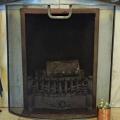Stoves and chimneys:
- The main issues with stoves are caused by the installation and the flue and its location relative to combustible items such as timber joists.
- If you are installing a stove, try to ensure that the flue is installed into an existing chimney.
- Don’t block up vents in rooms with stoves.
- A lot of stove fires occur roughly 5 to 7 years after installation.
- Check all flues as they travel up through your house or through walls/floors.
- A smoke alarm in the attic is a good idea especially where such flues travel up through the attic.
- Clean your chimney at least annually.
- Chimney fires can be caused by incomplete combustion in the stove/fire, can damage the chimney lining and/or transfer enough heat through the wall to ignite nearby combustibles (timber joists, insulation etc.).
- Stove flues should be checked for faults and cleaned regularly.
- Keep the area next to the fire clear of mats and other items.
- Make sure that no electrical appliances are kept near the fireplace.
- When you remove ashes store them in a metal bucket away from other items and allow them to cool down.
- Always ensure a spark guard is in place just after lighting the fire and when leaving the room. It is a bad idea to hang clothes to dry on the fireguard. A fully enclosed spark guard is best.
Candles and incense
- When you are leaving the room or going to sleep you should blow out any candles, incense or oil burners.
- Keep candles apart. Leave at least 10cm between two burning candles
- Don’t move them when they’re burning. Extinguish candles before moving them. Also, don’t let anything fall into the hot wax like match sticks.
- These items should always be held firmly in heat-resistant holders and placed on a stable surface where they won’t be knocked over.
- Keep candle flame away from material that might catch fire such as curtains, furniture, clothes and hair.
- Be especially careful if you have a lot of flammable items in your home, like collections of books, magazines or papers.
- Be aware that tea lights get very hot and without proper holders can melt through plastic surfaces like a TV or bath.
- To avoid accidents keep candles and other naked flames out of reach of children and pets.
- Don’t put candles under shelves. Make sure there’s at least one metre between a candle and any surface above it.
- Double check they’re out. Candles that have been put out can go on smouldering and start a fire
- Yankee candles when they get to bottom are extremely hot, modern baths made of plastic will burn.
Tips for smokers
- It's safer to smoke outside, but make sure cigarettes are put out and disposed of properly.
- Avoid smoking on arm chairs and sofas – especially if you think you might fall asleep.
- Take extra care when you’re tired, taking prescription drugs or if you’ve been drinking alcohol.
- Use proper ashtrays, which can’t tip over and make sure to stub cigarettes out properly.
- Don't balance cigars or cigarettes on the edge of an ashtray, or anything else – they can tip and fall as they burn away and cause a fire.
- Don’t leave lit pipes or cigarettes unattended.
- Always empty ashtrays carefully. Make sure smoking materials are out, cold and preferably wet them before throwing into a bin – never use a wastepaper basket.
- Keep matches and lighters out of children’s reach, and buy child resistant lighters.
- Never smoke if you use healthcare equipment like medical oxygen or an air flow pressure relief mattress. If you use paraffin-based emollient creams, ask for non-flammable alternatives instead.
- Consider additional safety measures such as fire retardant bedding or nightwear.
Electronic cigarette safety tips
- Electronic cigarettes can cause less fires than normal cigarettes.
- Only use the battery and charger provided with the e-cigarette.
- Avoid charging the e-cigarette overnight.
- Never use a damaged e-cigarette.
- Never use an electronic cigarette close to medical oxygen.
- All electrical appliances that don’t need to be left plugged in should be unplugged at the end of the day or before you leave the home.
